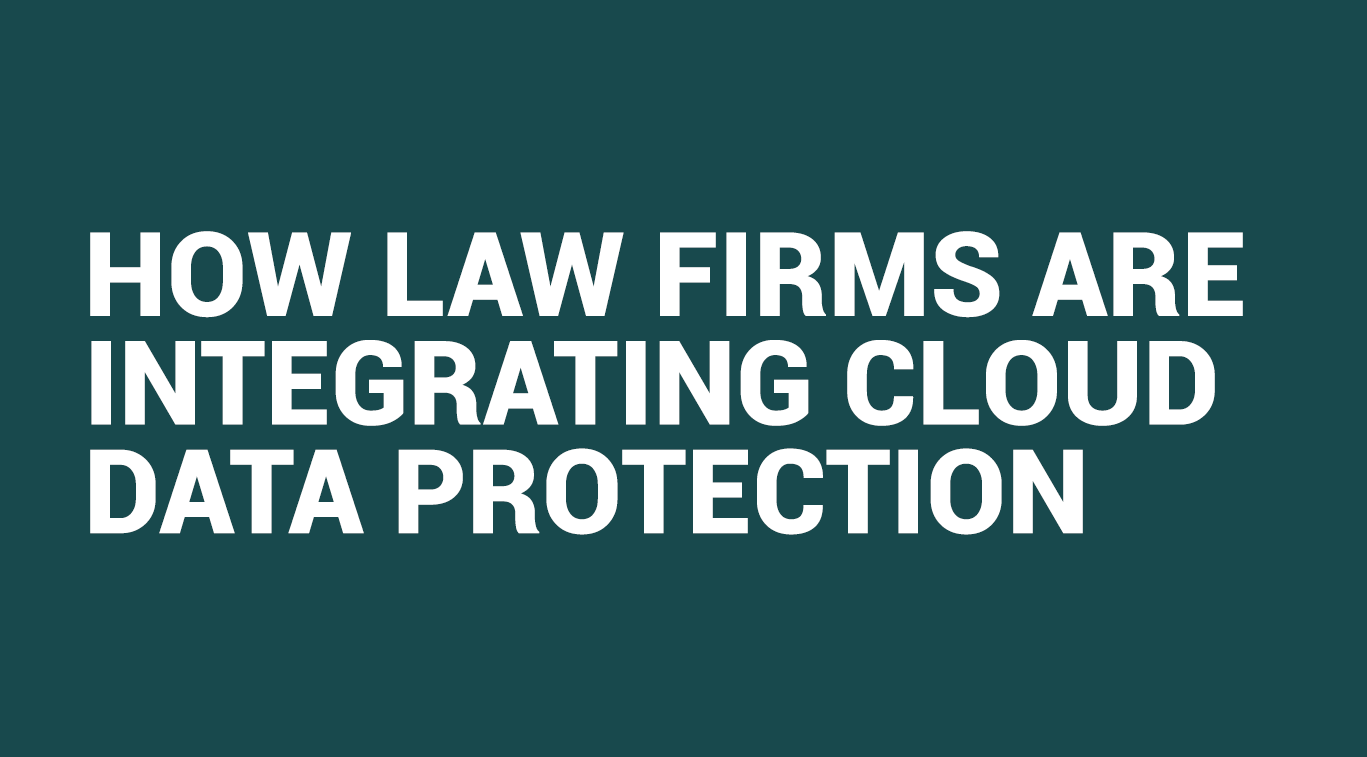How Law Firms are Integrating Cloud Data Protection

Written by Ginevra Tortora
Blogger

Cloud data protection is a model focused on organizational data stored, manipulated, and managed in a cloud or hybrid environment. The model requires many data policies, strategies, and solutions to work in tandem. Data protection protects an organization’s data from compromise, loss, or theft. While traditional data protection models work well for simple on-premise deployments, they can get complicated with data housed in the cloud or hybrid environments.
When experts talk about data protection, it encapsulates:
Data protection: Dealing with the loss of data by looking into backup and recovery systems and processes.
Data Security: dealing with safeguarding company and customer data from internal and external threats.
Data Privacy: Dealing with control and managing access for different data segments so that only the right people can access appropriate information.[2]
The Cloud is still not so Popular among Law Firms
Increased cyberattacks significantly affected law firms during the pandemic, when they shut down offices and most employees worked remotely, but law firms have traditionally shied away from cloud services. Further, some clients may not be ready for the cloud, which forces decisions on whether a firm is willing and resourced to run two data-management systems. [3]
Although advanced cloud models for risk and compliance incorporate critical elements of secure computing by meeting or exceeding standard regulatory requirements, the EU General Data Protection Regulation (GDPR) has generated renewed concerns about cloud storage for the legal industry.
Because the regulation itself is sweeping and amorphous—and penalties for violating privacy and security standards are substantial—GDPR compliance presents a daunting hurdle, particularly for small and midsize firms. [4]
In addition to providing high security, cloud platforms automate identity management processes to ensure users are granted permission only to the specific tools and data sets deemed necessary—which can be changed, disabled, or deleted when appropriate.
In contrast, when in-house IT teams handle identity management, it’s common to apply a one-size-fits-all security policy giving users access to all applications and obscuring unusual access patterns. Once hackers breach the firewall, they gain access to the entire corporate network.[5]
However, this conservative tendency is lately shifting, and more firms are turning to the cloud.
So, what has caused the industry shift toward cloud migration?
Cloud Computing and Confidentiality
One driving force that kept many law firms from using cloud servers is client confidentiality. When practising law, the attorney-client privilege is essential and cannot be taken lightly. Even today, concerns about privacy and ethics are the main reasons cloud computing can be a contentious subject in the legal industry.
In the early days of cloud-based systems, these issues were a valid reason to avoid outsourcing data storage to an off-site server. However, cybersecurity advancements have led to the cloud often being more secure than on-site servers. Small to medium-sized law firms are particularly vulnerable to cyber-attacks since they usually don’t have the infrastructure or expertise to keep their servers safe. A Wi-Fi connection can leave information and files susceptible to a data breach even with a secure firewall.
Cloud services offer end-to-end encryption, backup servers, teams of expert IT professionals, and physical safety measures, such as securely locked rooms with top-of-the-line camera systems and 24/7 monitoring. These procedures are impossible for law firmsto enact at a lower cost than outsourcing.[6]
Cloud-Based Law Practice Management Software is Efficient
The benefits of being able to integrate and automate systems are one of the most significant advantages to companies using cloud technologies. Time-consuming and tedious tasks such as scheduling, billing, invoicing, file management, and the creation of legal documents are all streamlined on the cloud.
With a low barrier of entry and the ability to access their vital information whenever and wherever they need it, many hesitant legal teams are migrating to cloud-based systems, as Zoom meetings and online court hearings have become the norm.
Is the Cloud More Reliable than In-House Systems?
While it has been a long-standing belief that in-house servers are more reliable and secure than cloud systems, this is no longer the case. Cloud servers offer redundancy that is unmatched by internal servers since the cloud can utilize a secondary server if the primary system should fail. This leads to less downtime and a much lower risk of losing files to an equipment error, damage, or a data breach.
It is common to forget to create local server backups, leaving law firms vulnerable to data loss. Cloud systems can continually sync and update, so companies don’t have to worry about being able to access files or documents.[7]
Cloud Technology Saves Money
While efficiency is important, companies are trying to improve their bottom line at the end of the day. Cloud technology saves law firms money by allowing them to increase efficiency while eliminating the high cost of local data storage and maintenance. Not only that, but they can budget better by avoiding unexpected costs, inevitable when dealing with ageing hardware.
Another significant cost-saving feature of cloud-based law practice management software is the ability to scale. When data is kept on-site, scalability is considerably more expensive (and complex). Law firms using cloud technology can grow without updating or adding equipment, software, IT staff, or other expenses associated with keeping data management in-house. Being able to focus on the growth of the business and having predictable, consistent data management costs is a notable advantage when scaling.[8]
Therefore, probably law firms will increasingly trust the cloud system more in the following
[2] Id
[3] Thomas Hadig & Robert Barrett, How Law Firms Can Avoid Data Breaches Using the Cloud, 12 April 2022
[4] Id
[5] Id
[7] Id
[8] Id








